虚拟语气在if条件句中的用法
if条件句中的虚拟语气讲解

使用虚拟条件句要注意的几点:1.当条件状语从句表示的行为和主句表示的行为所发生的时间不一致时,被称为:错综时间条件句“,动词的形式要根据它所表示的时间作出相应的调整.If you had followed my advice , you would be better now.如果你听我的建议,你现在就会痊愈了.If you had studied hard before, you would be a college student now.如果你努力学习的话,你现在就会是大学生了.If they had worked hard, they would be very tired now.(从句说的是过去,主句指的是现在)2.省略句在条件句中,可省略if,把were ,had, should提到句首,变为倒装句式.If I were at school again, I would study harder.Were I at school again,I would study harder.If you had come earlier, you would have met him.Had you come earlier,you would have met him.If it should rain tomorrow, we would not go climbing.Should it rain tomorrow,we would not go climbing.Were I a boy, I would join the army.Had he taken my advice, he would have succeeded.Were it not for the expense, I would go to Britain.2、虚拟语气用于名词性从句(1)虚拟语气在宾语从句中的运用。
虚拟语气在条件状语从句中的用法(if条件句)

在写作中的应用
创作文学作品中
在创作小说、诗歌等文学作品时, 虚拟语气可以用来表达虚构的情 节和角色情感,增强作品的情感
色彩和艺术效果。
撰写学术论文
在撰写学术论文时,使用虚拟语 气可以表达假设的情景或条件, 例如在讨论不同政策或方案的影
响时。
写邮件和信件
在写邮件或信件时,使用虚拟语 气可以表达礼貌和尊重,例如在
在撰写商务广告和宣传材料时,使用虚拟语气可以增强语 言的感染力和说服力,例如“假如您正在寻找更好的产品 ,那么您来对了地方。”
感谢您的观看
THANKS
if条件句中的虚拟语气与时间状语从句的时态不一致
总结词
当if条件句中的虚拟语气与时间状语从句的时态不一致 时,通常是为了强调或表达与时间状语从句相反的情 况。
详细描述
在英语语法中,当if条件句中的虚拟语气与时间状语从 句的时态不一致时,通常是为了强调或表达与时间状语 从句相反的情况。这种用法能够使句子更加生动和富有 表现力,突出说话者对某个特定时间点的态度或情感。 例如,在句子"If I had known the answer yesterday, I would have told you."中,虚拟语气"had known" 与时间状语从句的时态"yesterday"不一致,强调了说 话者对过去的遗憾或后悔。
虚拟语气在条件状语从 句中的用法(if条件句)
目录
CONTENTS
• 虚拟语气在条件状语从句中的基本结构 • 虚拟语气在条件状语从句中的用法 • 虚拟语气在条件状语从句中的特殊情况 • 虚拟语气在条件状语从句中的实际应用
01 虚拟语气在条件状语从句 中的基本结构
虚拟语气在if条件从句中的用法
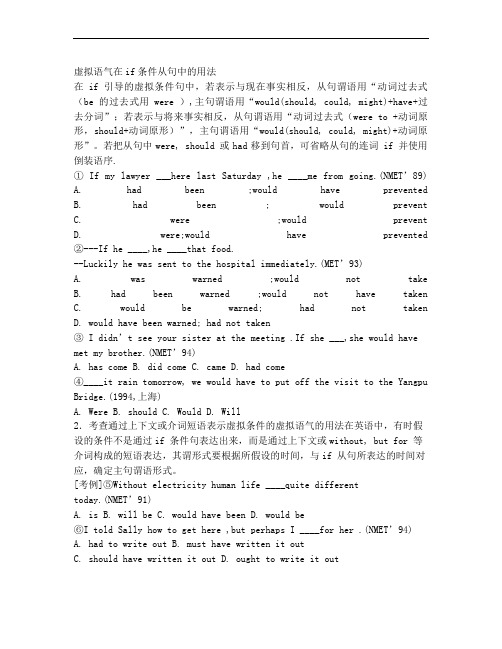
虚拟语气在if条件从句中的用法在if 引导的虚拟条件句中,若表示与现在事实相反,从句谓语用“动词过去式(be 的过去式用were ),主句谓语用“would(should, could, might)+have+过去分词”;若表示与将来事实相反,从句谓语用“动词过去式(were to +动词原形,should+动词原形)”,主句谓语用“would(should, could, might)+动词原形”。
若把从句中were, should 或had移到句首,可省略从句的连词 if 并使用倒装语序.① If my lawyer ___here last Saturday ,he ____me from going.(NMET’89)A. had been ;would have preventedB. had been ; would preventC. were ;would preventD. were;would have prevented②---If he ____,he ____that food.--Luckily he was sent to the hospital imme diately.(MET’93)A. was warned ;would not takeB. had been warned ;would not have takenC. would be warned; had not takenD. would have been warned; had not taken③I didn’t see your sister at the meeting .If she ___,she would have met my brother.(NMET’94)A. has comeB. did comeC. cameD. had come④____it rain tomorrow, we would have to put off the visit to the Yangpu Bridge.(1994,上海)A. WereB. shouldC. WouldD. Will2.考查通过上下文或介词短语表示虚拟条件的虚拟语气的用法在英语中,有时假设的条件不是通过if 条件句表达出来,而是通过上下文或without, but for 等介词构成的短语表达,其谓形式要根据所假设的时间,与if 从句所表达的时间对应,确定主句谓语形式。
if 条件句虚拟语气
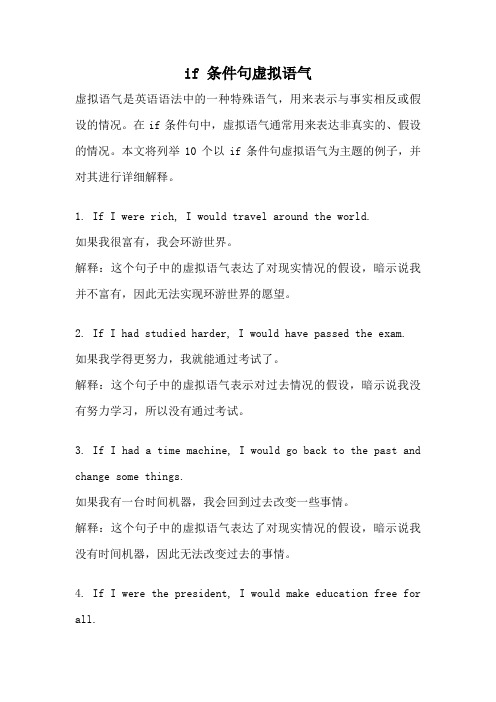
if 条件句虚拟语气虚拟语气是英语语法中的一种特殊语气,用来表示与事实相反或假设的情况。
在if条件句中,虚拟语气通常用来表达非真实的、假设的情况。
本文将列举10个以if条件句虚拟语气为主题的例子,并对其进行详细解释。
1. If I were rich, I would travel around the world.如果我很富有,我会环游世界。
解释:这个句子中的虚拟语气表达了对现实情况的假设,暗示说我并不富有,因此无法实现环游世界的愿望。
2. If I had studied harder, I would have passed the exam.如果我学得更努力,我就能通过考试了。
解释:这个句子中的虚拟语气表示对过去情况的假设,暗示说我没有努力学习,所以没有通过考试。
3. If I had a time machine, I would go back to the past and change some things.如果我有一台时间机器,我会回到过去改变一些事情。
解释:这个句子中的虚拟语气表达了对现实情况的假设,暗示说我没有时间机器,因此无法改变过去的事情。
4. If I were the president, I would make education free for all.如果我是总统,我会让教育对所有人免费。
解释:这个句子中的虚拟语气表达了对现实情况的假设,暗示说我并不是总统,所以无法实现让教育免费的目标。
5. If it didn't rain tomorrow, we could go hiking.如果明天不下雨,我们可以去远足。
解释:这个句子中的虚拟语气表达了对未来情况的假设,暗示说明天可能会下雨,所以无法去远足。
6. If I had known you were coming, I would have prepared a meal for you.如果我知道你要来,我会为你准备一顿饭。
if虚拟语气的三种用法
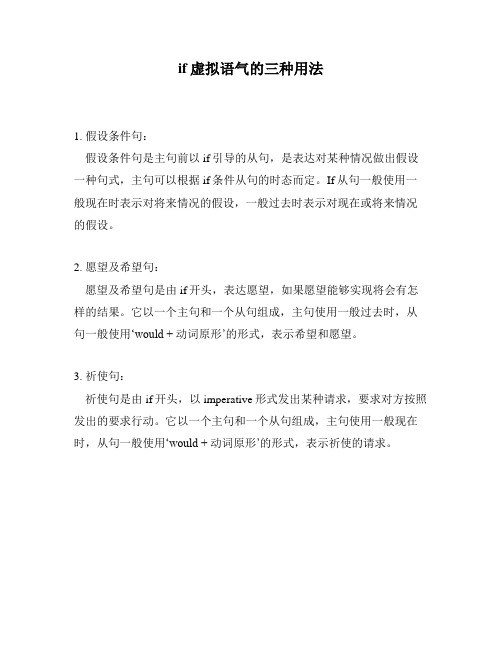
if虚拟语气的三种用法
1. 假设条件句:
假设条件句是主句前以if引导的从句,是表达对某种情况做出假设一种句式,主句可以根据if条件从句的时态而定。
If从句一般使用一般现在时表示对将来情况的假设,一般过去时表示对现在或将来情况的假设。
2. 愿望及希望句:
愿望及希望句是由if开头,表达愿望,如果愿望能够实现将会有怎样的结果。
它以一个主句和一个从句组成,主句使用一般过去时,从句一般使用‘would + 动词原形’的形式,表示希望和愿望。
3. 祈使句:
祈使句是由if开头,以imperative形式发出某种请求,要求对方按照发出的要求行动。
它以一个主句和一个从句组成,主句使用一般现在时,从句一般使用‘would + 动词原形’的形式,表示祈使的请求。
if引导虚拟语气的用法

if引导虚拟语气的用法1、表示与现在事实相反的情况:从句:If主语+过去时(Be动词用were)主句:主语+XXXdoeg:1.If I were you,I would take an XXX.如果我是你,我会带把伞。
(事实:我不可能是你)2.If I knew his telephone number,I would tell you.如果我知道他的电话号码,我就会告诉你。
(事实:不知道)3.If there were no air or water,there would be no living things on the earth.如果没有水和空气,地球上就不会有生物。
(事实:地球上既有空气也有水)4.If I had any money with me,I could lend you some.假如我带钱了,我就会借给你些。
(事实:没有带钱)5.If he XXX,he might pass the exam.如果他再努力些,就能通过考试了。
(事实:没有努力)6.she looked at me as if I had been a stranger.她看我的样子好像我是一个陌生人。
(事实:我并非陌生人)2、表示与过去事实相反的情况从句:If主语+had+done主句:主语+should/would/could/might+have doneeg:1.If I had got there earlier,I should/could have met her.如果我早到那儿,我就会见到她。
事实:去晚了)2.If he had XXX my advice,he would not have made such a XXX.如果他听我的劝告的话,就不会犯这样的错误了。
事实:没有听我的话)3、透露表现对未来情形的客观推测主句:主语+should+do从句:①if+主语+were to do②if+主语+should/would/could/might+do③if+主语+did(动词过去式)/wereeg:1.If he should come here tomorrow,I would talk to him.如果他明天来这儿的话,我就跟他谈谈。
if虚拟语气
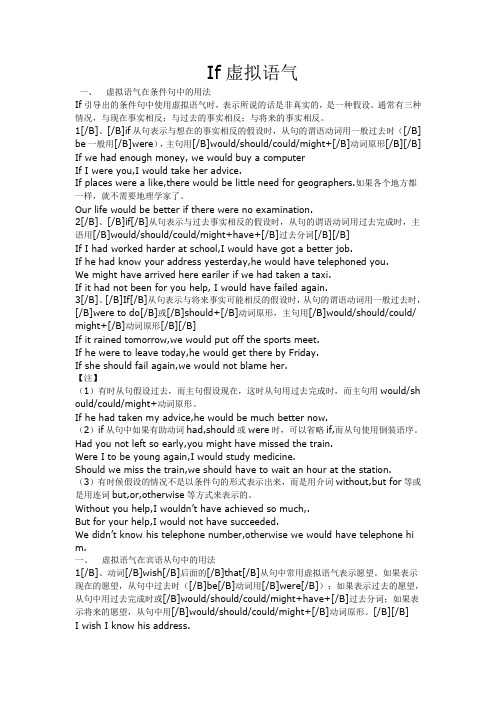
If虚拟语气一、虚拟语气在条件句中的用法If引导出的条件句中使用虚拟语气时,表示所说的话是非真实的,是一种假设。
通常有三种情况,与现在事实相反;与过去的事实相反;与将来的事实相反。
1[/B]、[/B]if从句表示与想在的事实相反的假设时,从句的谓语动词用一般过去时([/B] be一般用[/B]were),主句用[/B]would/should/could/might+[/B]动词原形[/B][/B] If we had enough money, we would buy a computerIf I were you,I would take her advice.If places were a like,there would be little need for geographers.如果各个地方都一样,就不需要地理学家了。
Our life would be better if there were no examination.2[/B]、[/B]if[/B]从句表示与过去事实相反的假设时,从句的谓语动词用过去完成时,主语用[/B]would/should/could/might+have+[/B]过去分词[/B][/B]If I had worked harder at school,I would have got a better job.If he had know your address yesterday,he would have telephoned you.We might have arrived here eariler if we had taken a taxi.If it had not been for you help, I would have failed again.3[/B]、[/B]If[/B]从句表示与将来事实可能相反的假设时,从句的谓语动词用一般过去时,[/B]were to do[/B]或[/B]should+[/B]动词原形,主句用[/B]would/should/could/ might+[/B]动词原形[/B][/B]If it rained tomorrow,we would put off the sports meet.If he were to leave today,he would get there by Friday.If she should fail again,we would not blame her.【注】(1)有时从句假设过去,而主句假设现在,这时从句用过去完成时,而主句用would/sh ould/could/might+动词原形。
if引导的条件句中的虚拟语气
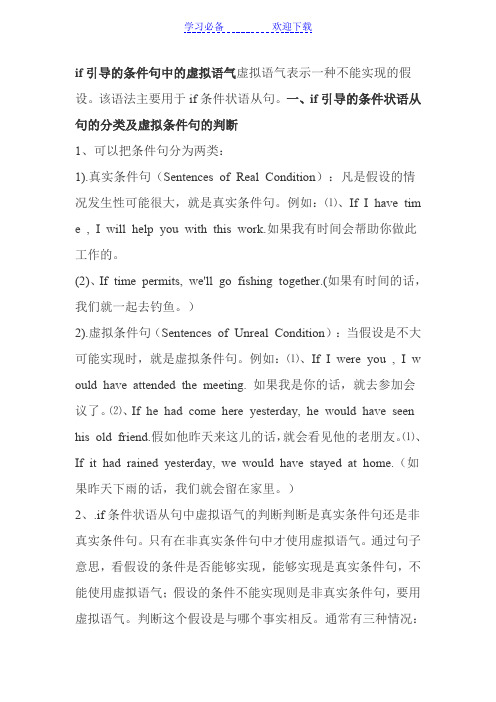
if引导的条件句中的虚拟语气虚拟语气表示一种不能实现的假设。
该语法主要用于if条件状语从句。
一、if引导的条件状语从句的分类及虚拟条件句的判断1、可以把条件句分为两类:1).真实条件句(Sentences of Real Condition):凡是假设的情况发生性可能很大,就是真实条件句。
例如:⑴、If I have tim e , I will help you with this work.如果我有时间会帮助你做此工作的。
(2)、If time permits, we'll go fishing together.(如果有时间的话,我们就一起去钓鱼。
)2).虚拟条件句(Sentences of Unreal Condition):当假设是不大可能实现时,就是虚拟条件句。
例如:⑴、If I were you , I w ould have attended the meeting. 如果我是你的话,就去参加会议了。
⑵、If he had come here yesterday, he would have seen his old friend.假如他昨天来这儿的话,就会看见他的老朋友。
⑴、If it had rained yesterday, we would have stayed at home.(如果昨天下雨的话,我们就会留在家里。
)2、.if条件状语从句中虚拟语气的判断判断是真实条件句还是非真实条件句。
只有在非真实条件句中才使用虚拟语气。
通过句子意思,看假设的条件是否能够实现,能够实现是真实条件句,不能使用虚拟语气;假设的条件不能实现则是非真实条件句,要用虚拟语气。
判断这个假设是与哪个事实相反。
通常有三种情况:①与过去事实相反。
②与现在事实相反。
③与将来事实可能相反。
3、“后退一步法”后退一步法是指在准确地判断了该句与哪一事实相反后,按虚拟语气的后退一步法处理从句谓语动词的时态。
虚拟语气if的用法
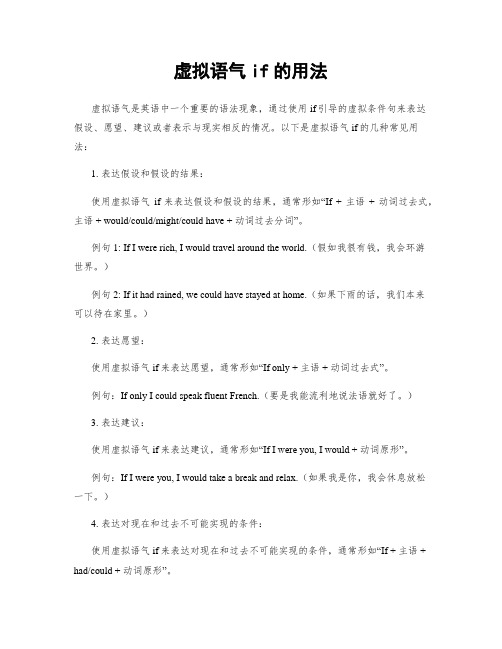
虚拟语气if的用法虚拟语气是英语中一个重要的语法现象,通过使用if引导的虚拟条件句来表达假设、愿望、建议或者表示与现实相反的情况。
以下是虚拟语气if的几种常见用法:1. 表达假设和假设的结果:使用虚拟语气if来表达假设和假设的结果,通常形如“If + 主语+ 动词过去式,主语 + would/could/might/could have + 动词过去分词”。
例句1: If I were rich, I would travel around the world.(假如我很有钱,我会环游世界。
)例句2: If it had rained, we could have stayed at home.(如果下雨的话,我们本来可以待在家里。
)2. 表达愿望:使用虚拟语气if来表达愿望,通常形如“If only + 主语 + 动词过去式”。
例句:If only I could speak fluent French.(要是我能流利地说法语就好了。
)3. 表达建议:使用虚拟语气if来表达建议,通常形如“If I were you, I would + 动词原形”。
例句:If I were you, I would take a break and relax.(如果我是你,我会休息放松一下。
)4. 表达对现在和过去不可能实现的条件:使用虚拟语气if来表达对现在和过去不可能实现的条件,通常形如“If + 主语 + had/could + 动词原形”。
例句1: If I had wings, I could fly in the sky.(如果我有翅膀,我就能在天空中飞翔。
)例句2: If I could play the piano, I would perform at the concert.(如果我会弹钢琴,我将会在音乐会上表演。
)总结起来,虚拟语气if的用法包括表达假设和假设的结果、愿望、建议以及对现在和过去不可能实现的条件。
if 的虚拟语气的用法
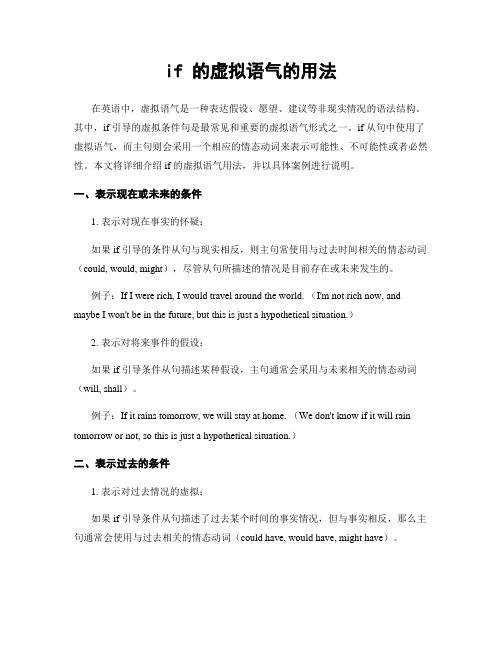
if 的虚拟语气的用法在英语中,虚拟语气是一种表达假设、愿望、建议等非现实情况的语法结构。
其中,if 引导的虚拟条件句是最常见和重要的虚拟语气形式之一。
if 从句中使用了虚拟语气,而主句则会采用一个相应的情态动词来表示可能性、不可能性或者必然性。
本文将详细介绍 if 的虚拟语气用法,并以具体案例进行说明。
一、表示现在或未来的条件1. 表示对现在事实的怀疑:如果 if 引导的条件从句与现实相反,则主句常使用与过去时间相关的情态动词(could, would, might),尽管从句所描述的情况是目前存在或未来发生的。
例子:If I were rich, I would travel around the world. (I'm not rich now, and maybe I won't be in the future, but this is just a hypothetical situation.)2. 表示对将来事件的假设:如果 if 引导条件从句描述某种假设,主句通常会采用与未来相关的情态动词(will, shall)。
例子:If it rains tomorrow, we will stay at home. (We don't know if it will rain tomorrow or not, so this is just a hypothetical situation.)二、表示过去的条件1. 表示对过去情况的虚拟:如果 if 引导条件从句描述了过去某个时间的事实情况,但与事实相反,那么主句通常会使用与过去相关的情态动词(could have, would have, might have)。
例子:If she had studied harder, she could have passed the exam. (She didn't study hard enough, so she failed the exam. This is a hypothetical situation that didn't happen in reality.)2. 表示无法改变的过去情况:如果 if 引导条件从句表达了对以往事件的遗憾、怀念或不同寻常反事实假设,主句通常会使用与过去相关的情态动词(could/would/should/might + 过去完成时)。
if条件句虚拟语气
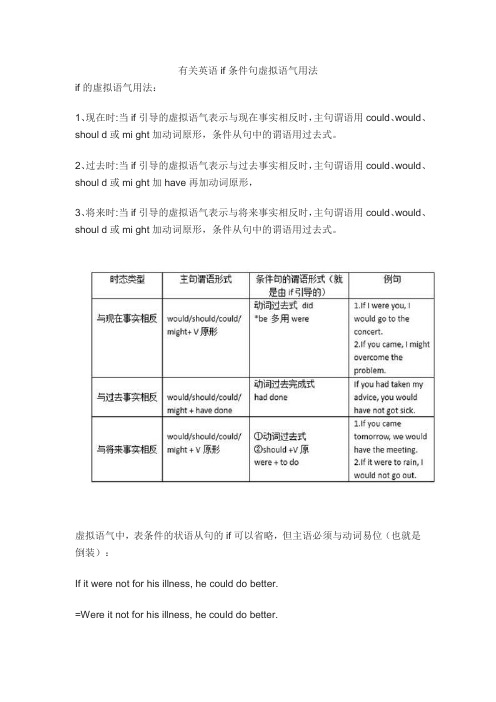
有关英语if条件句虚拟语气用法
if的虚拟语气用法:
1、现在时:当if引导的虚拟语气表示与现在事实相反时,主句谓语用could、would、shoul d或mi ght加动词原形,条件从句中的谓语用过去式。
2、过去时:当if引导的虚拟语气表示与过去事实相反时,主句谓语用could、would、shoul d或mi ght加have再加动词原形,
3、将来时:当if引导的虚拟语气表示与将来事实相反时,主句谓语用could、would、shoul d或mi ght加动词原形,条件从句中的谓语用过去式。
虚拟语气中,表条件的状语从句的if可以省略,但主语必须与动词易位(也就是倒装):
If it were not for his illness, he could do better.
=Were it not for his illness, he could do better.
如果不是因为他生病,他可以做得更好。
If he had money, he would buy that villa.
= Had he money, he would buy that villa.
对将来情况的虚拟:
主句:主语+would/should/might/could+动词原形从句:should+动词原形/were to+动词原形。
对现在情况的虚拟:
主句:主语+would/should/might/could+动词原形从句:动词过去式
对过去情况的虚拟:
主句:主语+would/should/might/could have+动词过去分词从句:had+动词过去分词。
虚拟语气在if条件句中的用法

If I were a boy, I think I could understand how it feels to love a girl.
If I were a boy,I would roll out of bed in the morning. 如果我是一个男孩, 我会在清晨翻身下床。 如果我是一个男孩,我想 我会明白爱上一个女孩会 是怎样的感觉。
Байду номын сангаас
If you had worked hard ,you would have passed the exam .
If they had had enough rain last year, they would have gained good harvest.
If he had driven more carefully yesterday, he would not have had the car accident .
2.I didn’t see your sister at the meeting. If she__h_a_d__c_o_m_e_______ (come), she__w_o_u__ld__h_a_v_e_m__e_t__ (meet) my brother.
3. Miss Jiang explained the homework to the class yesterday. If Judy ___h_a_d_p_a_i_d___________(pay) more attention at the time, he_w_o_u_l_d__n_o_t_h_a_v_e_m__i_ss_ed (not miss) her instructions(介绍).
When(时间)
if虚拟语气的用法归纳表格
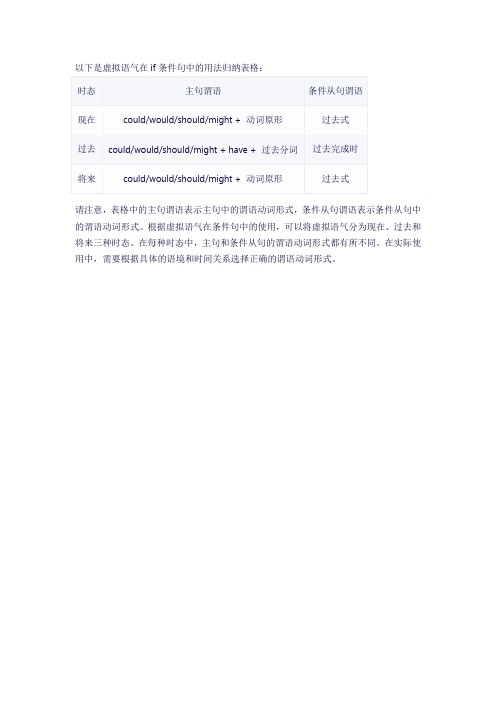
以下是虚拟语气在if条件句中的用法归纳表格:d/would/should/might + 动词原形
过去式
过去
could/would/should/might + have + 过去分词
过去完成时
将来
could/would/should/might + 动词原形
过去式
if引导虚拟语气的用法
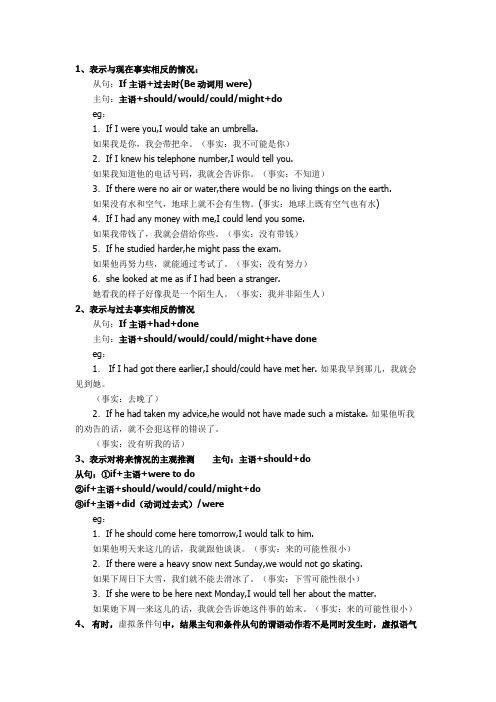
1、表示与现在事实相反的情况:从句:If 主语+过去时(Be动词用were)主句:主语+should/would/could/might+doeg:1.If I were you,I would take an umbrella.如果我是你,我会带把伞。
(事实:我不可能是你)2.If I knew his telephone number,I would tell you.如果我知道他的电话号码,我就会告诉你。
(事实:不知道)3.If there were no air or water,there would be no living things on the earth.如果没有水和空气,地球上就不会有生物。
(事实:地球上既有空气也有水)4.If I had any money with me,I could lend you some.如果我带钱了,我就会借给你些。
(事实:没有带钱)5.If he studied harder,he might pass the exam.如果他再努力些,就能通过考试了。
(事实:没有努力)6.she looked at me as if I had been a stranger.她看我的样子好像我是一个陌生人。
(事实:我并非陌生人)2、表示与过去事实相反的情况从句:If 主语+had+done主句:主语+should/would/could/might+have doneeg:1. If I had got there earlier,I should/could have met her. 如果我早到那儿,我就会见到她。
(事实:去晚了)2.If he had taken my advice,he would not have made such a mistake. 如果他听我的劝告的话,就不会犯这样的错误了。
(事实:没有听我的话)3、表示对将来情况的主观推测主句:主语+should+do从句:①if+主语+were to do②if+主语+should/would/could/might+do③if+主语+did(动词过去式)/wereeg:1.If he should come here tomorrow,I would talk to him.如果他明天来这儿的话,我就跟他谈谈。
if条件句中的虚拟语气讲解
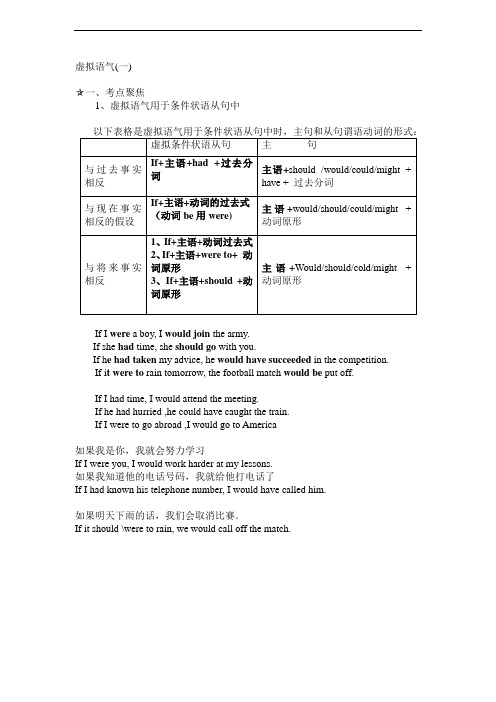
虚拟语气(一)一、考点聚焦1、虚拟语气用于条件状语从句中If I were a boy, I would join the army.If she had time, she should go with you.If h e had taken my advice, he would have succeeded in the competition.If i t were to rain tomorrow, the football match would be put off.If I had time, I would attend the meeting.If he had hurried ,he could have caught the train.If I were to go abroad ,I would go to America如果我是你,我就会努力学习If I were you, I would work harder at my lessons.如果我知道他的电话号码,我就给他打电话了If I had known his telephone number, I would have called him.如果明天下雨的话,我们会取消比赛.If it should \were to rain, we would call off the match.使用虚拟条件句要注意的几点:1.当条件状语从句表示的行为和主句表示的行为所发生的时间不一致时,被称为:错综时间条件句“,动词的形式要根据它所表示的时间作出相应的调整.If you had followed my advice , you would be better now.如果你听我的建议,你现在就会痊愈了.If you had studied hard before, you would be a college student now.如果你努力学习的话,你现在就会是大学生了.If they had worked hard, they would be very tired now.(从句说的是过去,主句指的是现在)2.省略句在条件句中,可省略if,把were ,had, should 提到句首,变为倒装句式.If I were at school again, I would study harder.Were I at school again, I would study harder.If you had come earlier, you would have met him.Had you come earlier, you would have met him.If it should rain tomorrow, we would not go climbing.Should it rain tomorrow, we would not go climbing.Were I a boy, I would join the army.Had he taken my advice, he would have succeeded.Were it not for the expense, I would go to Britain.2、虚拟语气用于名词性从句(1)虚拟语气在宾语从句中的运用。
if条件状语从句中虚拟语气
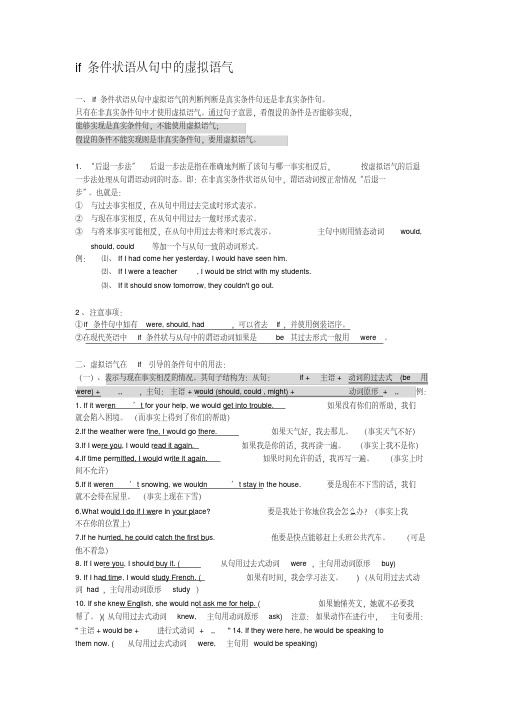
if条件状语从句中的虚拟语气一、if条件状语从句中虚拟语气的判断判断是真实条件句还是非真实条件句。
只有在非真实条件句中才使用虚拟语气。
通过句子意思,看假设的条件是否能够实现,能够实现是真实条件句,不能使用虚拟语气;假设的条件不能实现则是非真实条件句,要用虚拟语气。
1. “后退一步法”后退一步法是指在准确地判断了该句与哪一事实相反后,按虚拟语气的后退一步法处理从句谓语动词的时态。
即:在非真实条件状语从句中,谓语动词按正常情况“后退一步”。
也就是:①与过去事实相反,在从句中用过去完成时形式表示。
②与现在事实相反,在从句中用过去一般时形式表示。
③与将来事实可能相反,在从句中用过去将来时形式表示。
主句中则用情态动词would,should, could 等加一个与从句一致的动词形式。
例:⑴、If I had come her yesterday, I would have seen him.⑵、If I were a teacher, I would be strict with my students.⑶、If it should snow tomorrow, they couldn't go out.2、注意事项:①if条件句中如有were, should, had,可以省去if,并使用倒装语序。
②在现代英语中if条件状与从句中的谓语动词如果是be其过去形式一般用were。
二、虚拟语气在if 引导的条件句中的用法:(一)、表示与现在事实相反的情况。
其句子结构为:从句:if + 主语+ 动词的过去式(be 用were) + ,,,主句:主语+ would (should, could , might) + 动词原形+ ,,例:1. If it weren’t for your help, we would get into trouble. 如果没有你们的帮助,我们就会陷入困境。
(而事实上得到了你们的帮助)2.If the weather were fine, I would go there. 如果天气好,我去那儿。
if 条件句虚拟语气
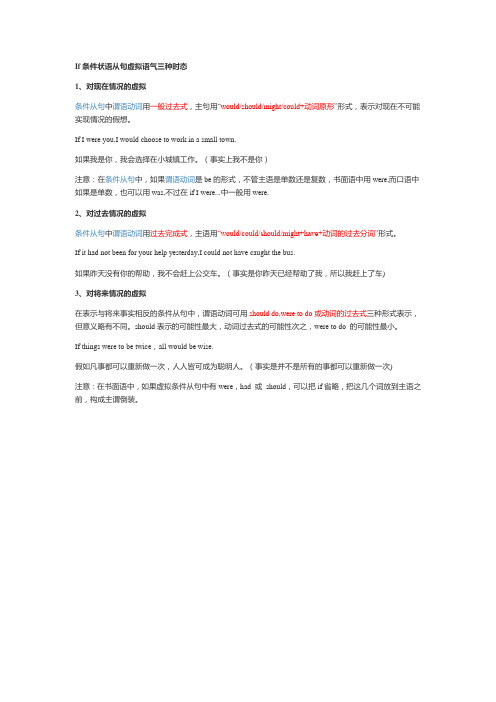
If条件状语从句虚拟语气三种时态1、对现在情况的虚拟条件从句中谓语动词用一般过去式,主句用“would/should/might/could+动词原形”形式,表示对现在不可能实现情况的假想。
If I were you,I would choose to work in a small town.如果我是你,我会选择在小城镇工作。
(事实上我不是你)注意:在条件从句中,如果谓语动词是be的形式,不管主语是单数还是复数,书面语中用were,而口语中如果是单数,也可以用was,不过在if I were...中一般用were.2、对过去情况的虚拟条件从句中谓语动词用过去完成式,主语用“would/could/should/might+have+动词的过去分词”形式。
If it had not been for your help yesterday,I could not have caught the bus.如果昨天没有你的帮助,我不会赶上公交车。
(事实是你昨天已经帮助了我,所以我赶上了车)3、对将来情况的虚拟在表示与将来事实相反的条件从句中,谓语动词可用should do,were to do或动词的过去式三种形式表示,但意义略有不同。
should表示的可能性最大,动词过去式的可能性次之,were to do 的可能性最小。
If things were to be twice,all would be wise.假如凡事都可以重新做一次,人人皆可成为聪明人。
(事实是并不是所有的事都可以重新做一次)注意:在书面语中,如果虚拟条件从句中有were,had 或should,可以把if省略,把这几个词放到主语之前,构成主谓倒装。
if的虚拟语气用法总结
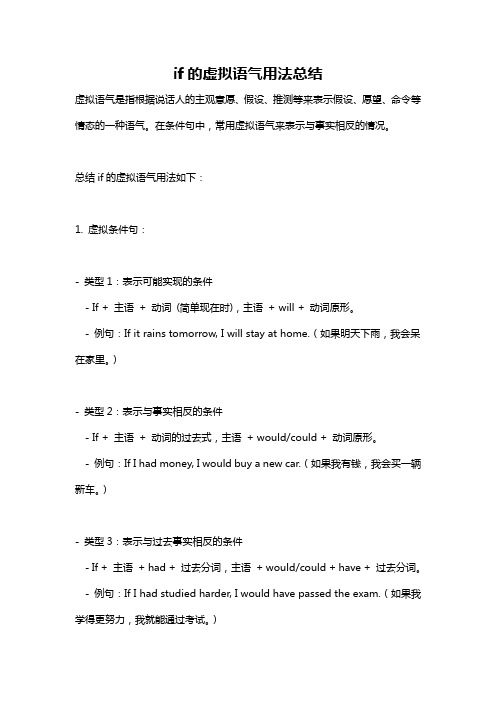
if的虚拟语气用法总结虚拟语气是指根据说话人的主观意愿、假设、推测等来表示假设、愿望、命令等情态的一种语气。
在条件句中,常用虚拟语气来表示与事实相反的情况。
总结if的虚拟语气用法如下:1. 虚拟条件句:- 类型1:表示可能实现的条件- If + 主语+ 动词(简单现在时),主语+ will + 动词原形。
- 例句:If it rains tomorrow, I will stay at home.(如果明天下雨,我会呆在家里。
)- 类型2:表示与事实相反的条件- If + 主语+ 动词的过去式,主语+ would/could + 动词原形。
- 例句:If I had money, I would buy a new car.(如果我有钱,我会买一辆新车。
)- 类型3:表示与过去事实相反的条件- If + 主语+ had + 过去分词,主语+ would/could + have + 过去分词。
- 例句:If I had studied harder, I would have passed the exam.(如果我学得更努力,我就能通过考试。
)2. 虚拟表达愿望:- 类型1:表示对现在或将来的愿望- 希望、愿望等动词+ (that) + 主语+ (should) + 动词原形。
- 例句:I wish (that) I could speak fluent English.(我希望我能说一口流利的英语。
)- 类型2:表示对过去的愿望- 希望、愿望等动词+ (that) + 主语+ (should) + have + 过去分词。
- 例句:I wish (that) I had studied abroad when I was younger.(我希望我年轻时出国留学了。
)3. 虚拟表达建议、命令等:- 动词原形+ (that) + 主语+ (should) + 动词原形。
- 例句:I suggest (that) you should take a break.(我建议你应该休息一下。
- 1、下载文档前请自行甄别文档内容的完整性,平台不提供额外的编辑、内容补充、找答案等附加服务。
- 2、"仅部分预览"的文档,不可在线预览部分如存在完整性等问题,可反馈申请退款(可完整预览的文档不适用该条件!)。
- 3、如文档侵犯您的权益,请联系客服反馈,我们会尽快为您处理(人工客服工作时间:9:00-18:30)。
飞了mi。ght fly in the sky. Were the little mouse a bird, …
如If果ToTmomha了d l解ea中rn国ed文ab化o,ut昨Ch天in他es就e c不ulture, h会e w戴o一uld顶n绿’t 色ha的ve帽wo子rn出a来gr了ee。n hat.
Stage5---Conclusion
Step 1---
1. 判断是否虚拟
Yes!
2. 判断虚拟类型
3. 谓语形式 Present? Past? Future?
Exercise 高考链接
1. If he __________my advice, he
wouldn’t have lost his job.
If he had received six more votes, he would be our chairman now.
如果他多得六票,现在就是我们的主席了。
Further Study
If虚拟句的倒装
Present
IWf IewreerIe a butterfly,
I would fly in the sky.
If it were/ should be fine tomorrow , I would go to see him.
如果上天能够给我一个再来一次的机会, 我会对那个女孩子说三个字:我爱你。 如果非要在这份爱上加上一个期限,我希望是--一万年!
If the God __s_h__o_u_l_d_/_w__e_r_e_t_o__g_i_v_e_/_g_a(gveive) me another chance,I__w_o_u__ld__t_e_l_l__ (tell)the girl three words: I love her! If our love __h_a__d_t_o__ (have to) be set a time limit, I wish it w__o_u_l_d__b_e___ (be)10,000 years!
要是昨晚下过雨的话,现在地面就会是湿的。
You would be much better now if you had taken my advice. 假若你当时听我的话,你现在就会好多了。
If I had not got married, I would still have been living abroad.
Had Tom learned about Chinese
culture, … If we should have a day off tomorrow, I 如wo果ul明d 天tre放at假yo,u 我to就ta请sty你fo吃od好. 吃的。
Should we have a day off tomorrow, …
Past
HIfahdehheadgogtotuupp earlier ,
he could have caught the train.
Future
IfSIhSohuoldulIdwwinin the lottery, I would buy an expensive car.
若if从句中有were, had(助动词), should, if可省,
如果我没结婚,我会仍然一直住在国外。
If you’d listened to me, you wouldn’t be in such trouble now. 如果你听了我的话,你现在也不会有这样的麻烦了。 If the doctor had come in time, Amy would still be alive. 如果医生及时赶到艾米现在还会活着。
If they had had enough rain last year, they would have gained good harvest.
If he had driven more carefully yesterday, he would not have had the car accident .
错综时间虚拟条件句
• 所谓错综时间虚拟条件句即条件从句与主 句所指时间不一致,如从句指过去,而主 句即指的是现在或将来,此时应根据具体 的语境情况,结合上面提到的三种基本类 型对时态作相应的调整:
错综时间虚拟条件句
If it had rained last night, the ground would be wet now.
A.followed
B. should follow
C. had followed D. would follow
2. If I ______ you, I ______ more
attention to English phrases.
A. was; shall pay B. am; will pay
Subjunctive Mood
虚拟语气在if条件句中的用法
If he were a bird , he could fly in the big blue sky.
If I had a lot of money, I would buy a villa . (别墅)
If you had worked hard ,you would have passed the exam .
C. woulday
3. If you were to do it, the result _____ different.
A: will be B: would be C: may be D: would have been
4. ________ it to rain tomorrow, we would have to put off the visit to the Yangpu Bridge.
